It’s New York, in the summer of 1969.
The country is being rocked by incredible social and political change. And as the temps rise, so do the tensions in the community as it faces yet another event of social upheaval. In short, people need something to celebrate. This summer, people in the community are about to experience a life-changing music festival that will bring attendees of all ages together, creating memories that stay in their hearts and consciousness for decades to come.
If you’re surprised to learn that this festival was none other than the Harlem Cultural Festival, you wouldn’t be alone.
Today, the once-in-a-lifetime event is largely forgotten, with nearly every record of its existence staying locked away in a New York basement for over 50 years. Then, last year, those recordings came back into the light.
In his directorial debut, musician and author Ahmir “Questlove” Thompson brings together the never-before-seen footage, creating a powerful and uplifting documentary that transports us back into a time that marked our community for decades to come.
Summer of Soul (…Or, When the Revolution Could Not Be Televised) premieres tomorrow in theaters and on Hulu, and with the events of the last year, this documentary and celebration of Black culture couldn’t be more timely.
We’ve all seen the iconic images and footage of Woodstock, the festival that many equate with the summer of 1969. But the Harlem Cultural Festival was different. This festival was ours: thoroughly, uniquely and unapologetically Black. And it was beautiful.
Set in Harlem, a cultural epicenter for the Black community, the six-week-long summer festival sought to bring joy and celebration to the Black community in New York — free of charge. It was produced and hosted by local community leader Tony Lawrence, whose aim was built off the simple idea that music brings people together in a way that nothing else can.He sought national and local talent, presenting acts that festival-goers now could only dream of Gladys Knight & the Pips. Mahalia Jackson. Sly and the Family Stone. B.B. King himself.
Held at the packed Mount Morris Park (now Marcus Garvey Park), the festival served up everything that was glorious and revolutionary about being Black during such a crucial time in history. As one festival attendee says: “‘69 was the pivotal year the ‘Negro’ died, and ‘Black’ was born.”
In the decade leading up to that year, the Black community lost beloved leaders like Dr. King and Malcolm and was at the painful forefront of many social movements and everyday discriminations that had people screaming for change.
Through the celebration and communion of the residents of Harlem and beyond, Black people as a collective could finally find release and joy through our music, which has been giving us a voice since the beginning of our history.
As one festival-goer mentions: “Before then, my world was Black and White. The concert took my life into color.”In his debut as a filmmaker, Questlove is seeking to change how, for ages, Black-centered events and iconography are shuttered or erased in favor of white-centered narratives. While Black erasure is nothing new in American history, that doesn’t mean its effect isn’t felt at every layer of the American experience. Now, Questlove is giving a greater voice to the Black experience.
This critically acclaimed documentary itself is a love letter and the ultimate celebration of Black music, culture and history. Check out the release of Summer of Soul (…Or, When the Revolution Could Not Be Televised) for a flashback into #BlackJoy that is just as needed today as it ever was.
You can catch its premiere in theaters tomorrow, or stream it on Hulu, nationwide.
This editorial is brought to you in partnership with Searchlight Pictures.
